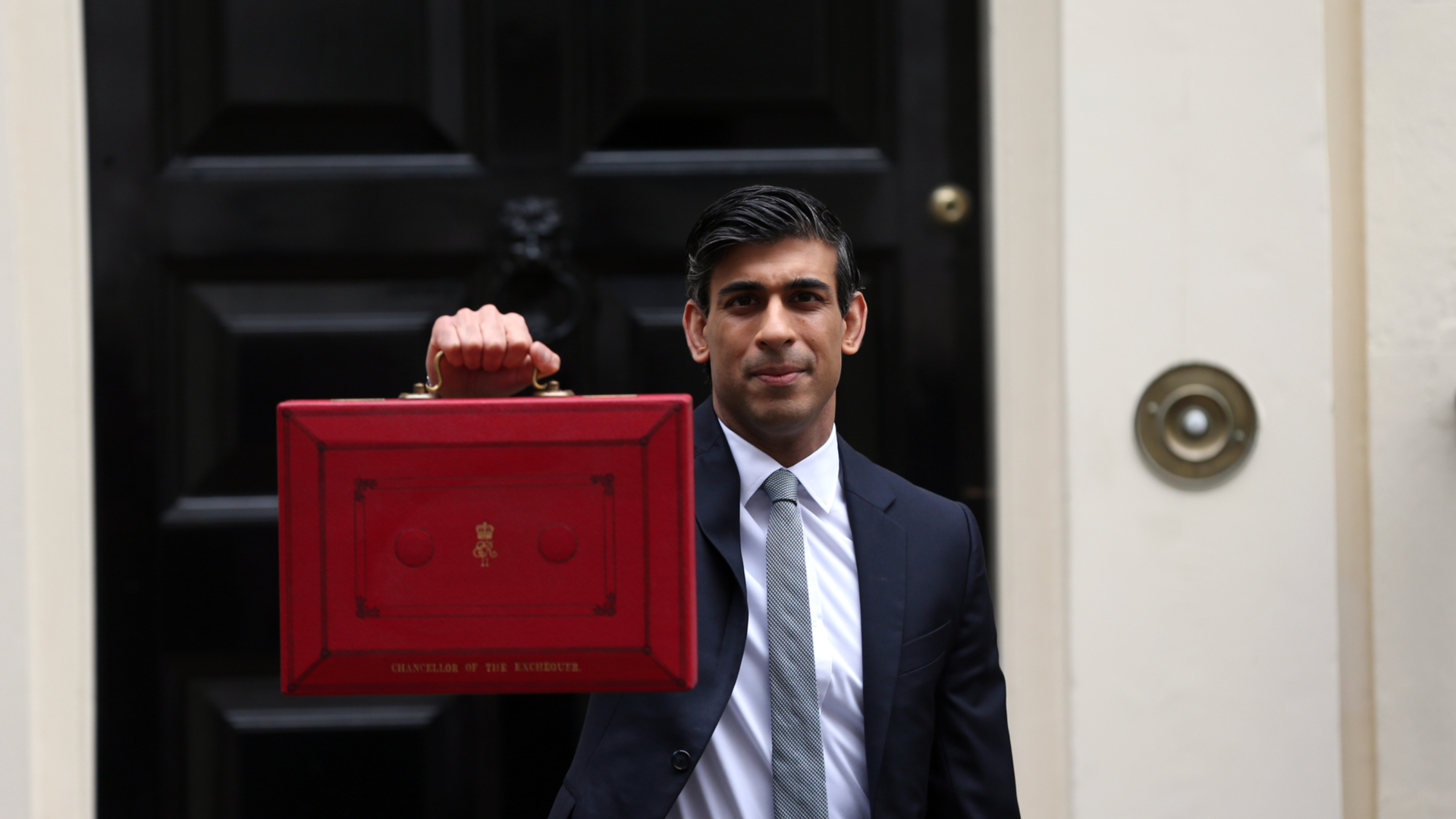Autumn Budget 2021: What it means for tech
Attracting global talent and investing in tech skills for Britons forms the backbone of Rishi Sunak's plans for the coming years


Chancellor Rishi Sunak unveiled the Autumn 2021 budget on Wednesday with a swathe of announcements and numerous investments for the tech sector.
The budget details the ways in which the UK government plans to foster the development of science, technology, engineering, and maths (STEM) skills, which comprised a sizeable portion of the government's 'Build Back Better' manifesto published in March this year.
Highlights for the tech industry include an overhaul to immigration to get the world's top tech talent working on British soil, a deep investment in upskilling and reskilling adults, a hefty sum set aside for the NHS, and tech-specific tax relief support.
Immigration
The government has announced an overhaul of the UK visa system that aims to attract the world's best in science and tech, adding that it aims to 'streamline' the visa process for all, in the hope that it will drive UK-wide innovation and overall jobs growth.
An 'elite points-based visa’ is being introduced, which will feature a fast track stream to speed up the process of moving overseas workers to the UK once they have a job offer from a recognised scale-up.
A reform to the Global Talent visa, which has previously been criticised for being far too narrow in scope, will automatically qualify anyone who holds certain international prizes, scholarships, and those enrolled on programmes for early promise. It will also review the Innovator visa, making it easier for skilled individuals to bring innovative business ideas to the UK market.
Doubts aside, the announcements regarding visa reforms have been greeted warmly by the industry.
Get the ITPro daily newsletter
Sign up today and you will receive a free copy of our Future Focus 2025 report - the leading guidance on AI, cybersecurity and other IT challenges as per 700+ senior executives
“For the technology sector to thrive, it needs to attract people who’ve already scaled businesses. The Global Talent Network should help attract entrepreneurs with that experience into the UK," said Paul Lee, global head of technology, media and telecommunications research at Deloitte to IT Pro. “The Scale-Up Visa will enable skilled and experienced technology workers to come and work in the UK, bolstering British businesses across a number of industries currently constrained by digital skills shortages."
Skills
Announced days before Wednesday's official Budget unveiling, Sunak promised to invest £3 billion into skills and education, getting Britons into better paying jobs.
As part of this, Sunak dedicated £550 million to what he calls a "skills revolution", which will see available places on boot camps for artificial intelligence (AI) and cyber security quadrupled. A further £1.6 billion will also be earmarked for around 100,000 students studying for T-Levels, affording more classroom hours for the technical qualifications.
Initial industry consensus suggests the proposals fall short of what is needed.
“Every budget announcement is full of promises but the devil is in the details," said James Petter, VP international at Pure Storage to IT Pro. "The digital skills gap is a huge issue affecting UK businesses, and as reported in the news, Mr Sunak’s plans to roll out new T-levels for 16-19 year olds and a 42% increase in spending on skills and training, although valid, are simply not enough.
"This is a mere drop in the ocean compared to the number of young people in the UK and the gaping hole we have in terms of those capable of working in fast-moving, high growth industries such as cloud computing and AI. A training programme is a valuable step but it just picks at the surface, and is a solution to issues faced by future generations, rather than solving a problem right here and right now."
RELATED RESOURCE

Next-generation time series: Forecasting for the real world, not the ideal world
Solve time series problems with AI
Echoing the criticism, Paramjit Uppal, CEO and founder of AND Digital said: "This [initiative] is in right direction. However, I would like to see more going into the software design/development skills development. The UK needs more skilled people who can build software and data solutions for every organisation – the gap in the needs of large and small, private and public sector organisations and the availability of talent is the single biggest competitive threat to the UK over the next 3-5 years.”
That said, there are some experts who are optimistic about the announcement such as Sir Charlie Mayfield, chairman at QA. Though, he stipulated the pressure is now on the government to deliver.
"The announcement of £3.8bn investment to support a skills revolution is extremely good news for individuals and businesses alike," he said to IT Pro.
"Employers up and down the country are in desperate need of digital skills, and this investment will help close that gap, and deliver the promises of ‘levelling up’ this Government is consistently promising. There are 100,000 open tech roles every month, and estimates suggest half the workforce or 15m people lack the digital skills employers need - without action that’ll rise to two-thirds by 2030."
A deeper look at the full Budget published on Wednesday revealed a further £138 milliion will be put towards funding in-demand technical and digital courses for adults, while £1.3 million will be invested in new technologies to help place people into jobs that match their skillset.
The government will also be providing support to small businesses to embrace new technologies, given a "relatively low adoption of digital technologies and software compared to international competitors". The support will aim to encourage small businesses to invest in new technologies to streamline processes, in areas like ecommerce.
NHS
Alongside previously announced investments designed to help clear the backlog of patients, Sunak also announced £2.1 billion will go towards supporting the overhaul of the NHS' infamously outdated IT systems.
The government hopes that the investment will give NHS healthcare providers access to the fastest broadband and better, more streamlined access to digital records.
The £2.1 billion investment will be delivered "over the next three years to support innovative use of digital technology so hospitals and other care organisations are as connected and efficient as possible, freeing up valuable NHS staff time and ensuring the best care for patients wherever they are", the government said.
The announcement has been met with criticism from the industry.
"While the extra funding to revamp the NHS' IT systems should be welcomed, more can be done if the Government wants to enhance the health services digital infrastructure, not all of which requires vast amounts of funding," said Hazel Jones, head of health at Made Tech to IT Pro.
"The Government should be looking to foster more collaboration in the NHS, encouraging trusts and CCGs to make their digital projects open source. This way, bodies can learn from the innovative solutions being put in place by one another and implement these in their own departments," she added. "This will help ensure services across the country all have the same opportunities to digitally level up, while also saving money as the risk of new projects failing is averted."
IT Pro contacted the Department for Health and Social Care, but it did not reply at the time of publication.
Taxation
There will be new changes made to the UK's research and development (R&D) tax relief scheme to cover areas such as cloud computing and costs associated with data processing for businesses - something Sunak said many companies have called for.
All in a bid to propel the UK further into the technology limelight, the modernisation of tax reliefs will aim to stimulate private sector innovation.
“The Chancellor’s plan to reform the R&D tax credit system to allow businesses to better utilise data and cloud computing services is a major upgrade to the UK’s support for research and development, marking a major step towards boosting UK productivity," said Julian David, CEO at techUK to IT Pro.
“At techUK we have been calling for the extension of tax reliefs to cover cloud computing and data costs for some time. The new regime recognises the way companies use technology to transform their businesses in the modern world. In particular, we can see that smaller businesses that use cloud computing and data-driven technologies have increased their annual turnovers in excess of £250,000."
Some experts believe the reformed tax relief strategy will help businesses digitally transform as some, banks specifically, struggle to implement cloud and data due to prohibitive costs.
“Cloud and data are necessities for any business that wants to digitally transform," said Priya Raju, director of cloud transformation at KPMG UK to IT Pro. "Companies – banks in particular – are struggling to implement cloud and data because the costs are often incredibly prohibitive.
"What’s more, with the volume of data growing exponentially (by 2025, estimates predict that the amount of data generated each day will reach 463 exabytes globally), these associated costs are only going to skyrocket. While today’s announcement is designed to help soften that blow, questions remain about the actual benefits the announcement will generate. Ambiguity around what the Government classifies as R&D could mean that the reliefs sound better on paper than they are in practice.”
Elsewhere under the taxation umbrella, HMRC will receive £180 million in additional resources and new technology to streamline the tax payment and collection process. The move is expected to generate a further £1.6 billion in tax revenue between now and 2025-26.
Sunak also announced a £7 billion package to cut business rates in a bid to make them 'fairer'. These will also now be re-evaluated every three years.
New investment relief is thought to encourage business investment in green technologies like solar panels. The leisure and hospitality sectors will also enjoy a one-year 50% cut to business rates after being among the hardest hit industries over the course of the pandemic.
Green technology
A greener outlook formed the backbone of Sunak's Autumn Budget, and various pan-industry announcements have been made to accelerate green tech adoption in the UK.
RELATED RESOURCE

Next-generation time series: Forecasting for the real world, not the ideal world
Solve time series problems with AI
For the rail industry, the government has said it will match fund up to £30 million, subject to business case, towards the construction of a rolling stock and infrastructure testing complex in Wales.
"Alongside contributions from the Welsh Government and the private sector, this would create a world class train testing facility on a former coalmining site," the Budget reads. "The Global Centre for Rail Excellence would support innovation in the UK’s rail industry, including the testing of cutting-edge, green technology."
There will also be a 20m investment in programmes to support development of floating offshore wind technology, plus a new £68 million UK-wide competition to implement several first-of-a-kind energy storage prototypes or technology demonstrators.

Connor Jones has been at the forefront of global cyber security news coverage for the past few years, breaking developments on major stories such as LockBit’s ransomware attack on Royal Mail International, and many others. He has also made sporadic appearances on the ITPro Podcast discussing topics from home desk setups all the way to hacking systems using prosthetic limbs. He has a master’s degree in Magazine Journalism from the University of Sheffield, and has previously written for the likes of Red Bull Esports and UNILAD tech during his career that started in 2015.
-
 Should AI PCs be part of your next hardware refresh?
Should AI PCs be part of your next hardware refresh?AI PCs are fast becoming a business staple and a surefire way to future-proof your business
By Bobby Hellard Published
-
 Westcon-Comstor and Vectra AI launch brace of new channel initiatives
Westcon-Comstor and Vectra AI launch brace of new channel initiativesNews Westcon-Comstor and Vectra AI have announced the launch of two new channel growth initiatives focused on the managed security service provider (MSSP) space and AWS Marketplace.
By Daniel Todd Published
-
 What does the Data Protection and Digital Information (DPDI) Bill mean for small businesses?
What does the Data Protection and Digital Information (DPDI) Bill mean for small businesses?In-depth Everything SMBs need to know as soon-to-be-updated data protection regulations make compliance easier and reduce costs
By Kate O'Flaherty Published
-
 "It's still not great": Industry divided on government's SMB tax relief package
"It's still not great": Industry divided on government's SMB tax relief packageNews The government’s handling of R&D tax credits has left SMBs with a “sense of disbelief”
By Ross Kelly Published
-
 UK startups dread Tech Nation loss as end of the road nears
UK startups dread Tech Nation loss as end of the road nearsIn-depth Tech Nation’s tireless championing of the UK tech industry has left founders in the lurch as Barclays Eagle Labs steps in to take the reigns
By Ross Kelly Published
-
 Technology Ecosystem benchmark report
Technology Ecosystem benchmark reportWhitepaper The evolution of the IT industry
By ITPro Published
-
 An end-to-end roadmap for SMB cloud migration
An end-to-end roadmap for SMB cloud migrationWhitepaper Future-proofing transformation
By ITPro Published
-
 Seven realities facing SMBs as they enter a future of increased cyber threats
Seven realities facing SMBs as they enter a future of increased cyber threatsWhitepaper 2022 Intel Cybersecurity outlook for small and midsize businesses
By ITPro Published
-
 Global economic downturn presents small businesses a ‘once in a generation’ hiring opportunity
Global economic downturn presents small businesses a ‘once in a generation’ hiring opportunityNews Smart hiring practices and investing in high-demand skills as the world falls into recession could help SMBs thrive in the long term, says Randstad
By Rory Bathgate Published
-
 Square offers sellers buy now, pay later integration with Clearpay
Square offers sellers buy now, pay later integration with ClearpayNews For the first time, Square customers in-person and online will be given the option to make a purchase as interest-free payments
By Rory Bathgate Published